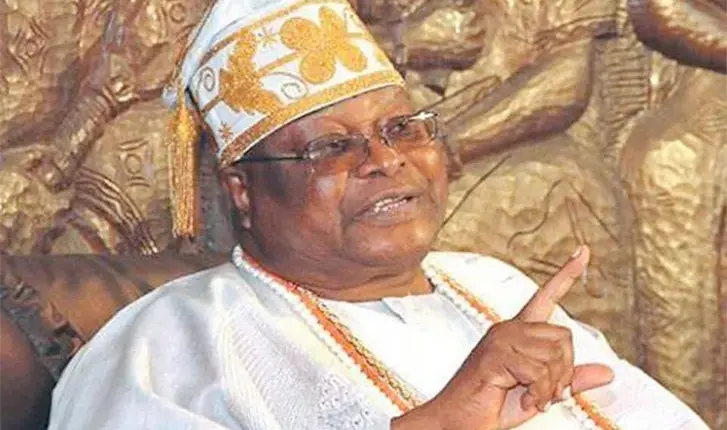In Nigeria, Sunday, July 13, 2025, was a day to remember. It was Nobel laureate Professor Wole Soyinka’s 91st birthday. Unfortunately, it was also the day that two friends—former President Muhammadu Buhari and Oba (Dr.) Sikiru Kayode Adetona, the Awujale of Ijebuland—paid back nature’s due.
In many ways, Awujale Adetona was remarkable. His father, Prince Rufai Adeleke, was destined to be king, but he gave the throne to his son instead, who ruled the Ijebu kingdom for 65 years after ascending to the throne just one month before his 26th birthday.
He exuded majesty in every manner, including appearance, demeanor, speech, and behavior. He always spoke the truth, had faith in his own judgment, and stood by his convictions. Nothing, not even a danger to his life, could make him change his mind.
After the military government of President Ibrahim Babangida brutally canceled the freest and fairest presidential election Nigeria had ever held, that much was demonstrated in a remarkable confrontation with General Sani Abacha, the dictator who governed Nigeria with an iron grip.
Even if he led an interim government, Awujale Adetona was certain that giving Bashorun MKO Abiola, who had won the election handily, control of the government was the only option to break the political impasse the military had created.
He arranged for opposition politicians, civil society activists, and other Abiola supporters to meet covertly—and even publicly—at his palace in Ijebu Ode. Because of this, he was dubbed “king of the National Democratic Coalition,” or Oba NADECO.
Awujale Adetona was adamantly against the injustice when General Abacha sent his deputy, Lieutenant General Oladipo Diya, to the gulag for a phantom coup and appeared determined to execute him and others.
In order to settle political scores, Ogun State Governor Bisi Onabanjo, one of the Awujale’s subjects, decided to have him removed during the Second Republic. However, he stood firmly, affirmed his rights, and refused to be subjected to what he believed to be unjustified persecution.
Colonel Oladipo Diya, the military governor of Ogun State, read the riot act to Ijebu Ode natives who had supported former governor Onabanjo, who was then imprisoned in Gen. Buhari’s gulag. Fortunately for him, Governor Onabanjo lost his seat to the coup that turned Major General Muhammadu Buhari into a military head of state.
Awujale Adetona consistently demonstrated uncommon radical and progressive features throughout his public career. He was able to successfully integrate the modern and the ancient by introducing new concepts to perform traditional duties and traditions.
In order to celebrate a much better Ojude Oba Carnival that matched the size, glitz, and glitz of the London Nothing Hill Carnival, the New Orleans Mardi Gras, and the Rio Carnival in Brazil, he led his people to construct an ultramodern palace and revive and introduce the Regberegbe age grade.
In order to accommodate more competitors, he was successful in convincing Segun Osoba, the former governor of Ogun State, to turn the former Public Works Department’s building across from the Aafin Awujale into the Ojude Oba Arena. However, in comparison to the enormous number of people at the Ojude Oba Carnival, that arena is currently getting smaller.
Read Also: NNPC Commits to Strengthening Africa’s Refining Sector, Eyes Regional Hub
The Ijebu Traditional Council, for kings; the Council of Otunba, for Otunbas; and the Council of Chiefs, for chiefs, are the three organizations into which he reorganized the coterie of Ijebu titleholders. To improve the standing of their towns, he made some “Baales” into crowned kings.
More significantly, though, he appointed people of high caliber to those roles while allowing the relevant families to choose the candidates for family titles and making an effort to advise them to choose deserving candidates.
However, others said that he went too far when he almost eliminated various customs due to his Islamic faith: He ceased taking part in the dance that signaled the entrance of Alagemo priests for their celebration in Ijebu Ode.
He was accused of ceasing to supply the necessary materials for the yearly Obirin Ojowu Festival and its celebration. Additionally, the Egungun Masquerades celebration in Ijebu Ode became scarce and almost extinct.
His successful persuasion of Ogun State Governor Dapo Abiodun and the State House of Assembly to pass a law allowing Ogun State kings to be buried in accordance with their religious beliefs rather than by traditionalists who allegedly hack the bodies of deceased kings into pieces for ritual purposes was the pinnacle of his radical and progressive qualities.
We offer our condolences to the people of Ijebu Ode on the passing of Awujale Sikiru Kayode Adetona, a unique and forward-thinking monarch who had a profoundly noteworthy influence on Yorubaland’s kingship system. “Whence comest another Awujale in the hue of the recently departed?” is the current query.

